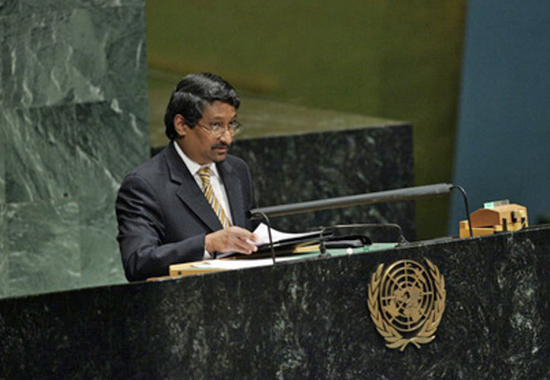|

Ahmed Khaleel from the Maldives Islands speaks at the UN
Climate Change Knows No Borders
|
|
Image Above
This is a photo of Mr Khaleel
from a different speech at the UN later that month.
Ahmed Khaleel, Permanent
Representative of the Republic of Maldives to the United
Nations, addresses a United Nations Conference on the World
Financial and Economic Crisis and its Impact on Development
on June 26, 2009.
UN Photo/Ryan Brown
|
It follows the full transcript of
Ahmed Khaleel's Address to the General Assembly
of the United Nations, New York, N.Y. — June 3, 2009.
Go here for more on former
 President Mohamed Nasheed.
President Mohamed Nasheed.

 |
The fourth assessment
report of |
the Intergovernmental Panel on Climate
Change (IPCC) clearly warned us of the adverse
consequences of climate change and global
warming, if
left unchecked.
That was two years ago.
Unfortunately,
today’s statistics are much more serious and
grim.
Human-induced climate change is accelerating
much
faster and far beyond the IPCC’s predictions.
The science is clear. Climate change is real. It
knows no borders and has now become by far the
most
serious threat facing human security.
While
there is no
longer a front line in the fight against climate
change,
for those countries like the Maldives and other
small
island developing States, with an average
elevation of
one metre above sea level, as well as for
low-lying
coastal areas across the globe, the situation
may be
much more precarious today than ever before.
Thus,
time is no longer a luxury that these countries
can
afford; nor can they afford to pick and choose
where
and when this important issue should be
discussed.
Climate change-related conflicts are slowly
beginning to emerge as water and other scarce
resources
are depleted, coastlines begin to recede, storms
and
floods become more frequent, and droughts are
prolonged. As my delegation stated in the
general debate
of this Assembly in September, for the Maldives
climate
change "is not solely a development issue, but
also a moral, ethical, political, legal and
human rights issue, as well as a grave security
issue" (A/63/PV.16, p.
40).
It was against that backdrop that the Maldives
took the initiative in 1987 to raise this issue
before the
Assembly.
It was also the reason why the
Maldives
participated at a high level in the Security
Council
debate on this issue in 2007.
It was the reason
why the
Maldives decided to raise this issue in the
Human
Rights Council last year, and it was also the
reason
why the Maldives unconditionally joined our
brothers
and sisters from the Pacific small island
developing
States (SIDS) in submitting the important
resolution
before us today.
Unlike two decades ago when we first raised the
issue of the real threat of some of the
low-lying SIDS,
including the Maldives, disappearing from the
face of
the Earth due to global warming and sea-level
rise,
climate change is a better understood and
documented
phenomenon today.
We have certainly taken our
time in
reaching scientific and political consensus on
the
nature and threat of climate change.
It is true that two decades of global action
have
not yielded the results that we expected. Yet we
refuse
to give up hope. We believe that a true
partnership with
a common and shared vision of commitment and
multilateral solidarity can still guarantee our
future.
Indeed, we have the means and the resources;
what is
lacking is political will.
As the
Secretary-General has
been stressing, we will have to seal the deal in
Copenhagen. If we do not, it may be too late for
some
of us.
Before I conclude, let me take this opportunity
to
express my delegation’s sincere appreciation to
the
Pacific SIDS for taking this important
initiative. We
commend them for this brave and courageous
undertaking. The consensus adoption of
resolution
63/281, sponsored by nearly 90 countries,
signals the
importance that the international community
attaches
to climate change and its possible security
implications.
We are fully convinced that the
resolution
will become an important milestone in the annals
of the
Assembly.

More History
|